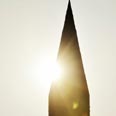
Syria denies it gave Hezbollah Scud missiles
Following reports that Syria transferred Scud missiles to Shiite group in Lebanon, Damascus says Israel aims to 'further strain atmosphere in region'
Syria warned Thursday that Israel was paving the way for new military action in the region with its allegation that Damascus is providing Scud missiles to the Lebanese militant group Hezbollah.
Israeli defense officials have said they believe Hezbollah has Scud missiles capable of hitting all of Israel and earlier this week, Israeli President Shimon Peres accused Damascus of providing the weapons.
Syria strongly denied the charge, saying it "believes that Israel aims through these claims to further strain the atmosphere in the region," according to a statement from the Foreign Ministry. It added that Israel could be setting the stage for a possible "Israeli aggression in order to run away from the requirements of a just and comprehensive peace."
Defense Minister Ehud Barak insisted earlier this week that Israel does not have aggressive intentions in the area.
"We expect and recommend that everyone keep the current calm but as we've said, the introduction of systems that disturb the balance endanger the stability and the calm," he said.
The allegation comes at a sensitive time in US-Syrian relations.
Washington has reached out to Syria in recent months by nominating the first US ambassador to Damascus since 2005 and sending top diplomats to meet with Assad. Washington is hoping to draw Syria away from Iran, Hezbollah and the Palestinian Islamic group Hamas.
The US said Wednesday it was "increasingly concerned" about the transfer of more sophisticated weaponry to Hezbollah.
Some Scud missiles have a range of hundreds of miles (kilometers) and could reach any target in Israel if fired from Lebanon. They can carry an explosive warhead of up to 1 ton.
The Israeli defense officials stopped short of stating unequivocally that Scuds are now deployed in Lebanon.
In August, Hezbollah leader Sheik Hassan Nasrallah said his militants were now capable of hitting any Israeli city or village. Nasrallah had earlier said Hezbollah has more than 30,000 rockets of different ranges but the group's officials never mentioned Scuds.
Hezbollah fired nearly 4,000 rockets at northern Israel, including several medium-range missiles that for the first time hit Israel's third-largest city, Haifa, during a 34-day conflict in 2006.
The Israeli officials said tensions have risen along Israel's border with Lebanon after media reports that Hezbollah was seeking the missiles, and they believed Hezbollah now has them.
Peres took it a step further and accused Syria of supplying the group with the weapons, the first time an Israeli official has publicly made such a pronouncement.
Public accusation
Israel charges that most of Hezbollah's weapons, including rockets, come through neighboring Syria, which is a main sponsor of Hezbollah, along with Iran. But Peres' statement was the first time Israel has publicly accused Damascus of providing Scuds.
Hezbollah spearheaded guerrilla warfare against Israeli forces that occupied parts of southern Lebanon for 18 years until May 2000. In 2006, the war between Israel and Lebanon's Hezbollah group left 1,200 Lebanese and 160 Israelis dead.
Meanwhile in Lebanon, political factions held a new round of national talks Thursday over a defense strategy that could integrate Hezbollah's weapons into the regular armed forces. Several rounds were held in the past without making progress.
As the officials met at the presidential palace southeast of Beirut, Israeli warplanes were seen flying over the capital - a common occurrence.










